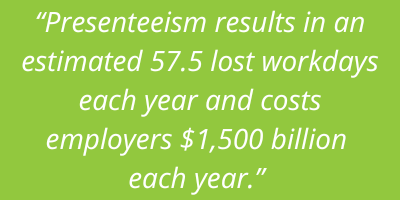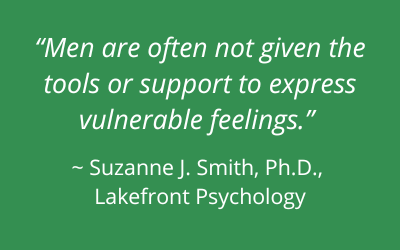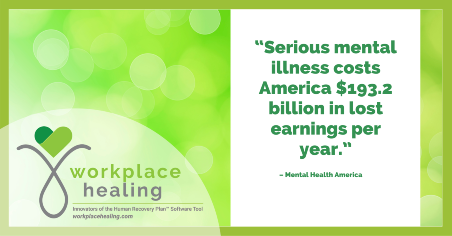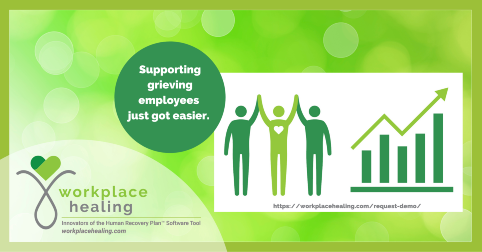
How Men Grieve: What’s Healthy & What’s Not
Men have a tendency to grieve differently. Because of male mental health stigmas, grieving men may not get the workplace support they need, which can lead to health issues, absenteeism, presenteeism and more.
Because grief is both a universal and an individual experience, we generally refrain from stereotyping how a man or a woman grieves based solely on their gender. But, it’s worth noting that research does suggest men have a tendency to express their grief differently than women, which could be due to a combination of cultural messaging and biology.
As a leader, it can be helpful to understand what male grief patterns can look like to help you determine the best ways to support a male employee mourning the loss of a loved one.
Read on to learn three common red flags that could indicate your employee is struggling more than he’s willing to admit, as well as healthy coping mechanisms that can be supportive during grief recovery.
(*Please note: Although this article is about how men grieve, women can also express grief in these same ways. Learn more about the ways grief can impact any employee.)
Red Flag
Work to distract. Work can provide grievers with a sense of control when everything else in life feels messy and chaotic. Grieving men may work more to distract themselves from the emotional pain they are feeling. It can become a problem if they use work to avoid dealing with their grief.
Workaholism occurs when a person prioritizes work over everything else in their life, including relationships, relaxing past-times, and hobbies they used to enjoy. Like alcohol, drugs and other addictive behaviors, work can offer a distraction or an escape, numbing anxious thoughts and difficult emotions.
Working too much can easily go unnoticed in a culture that rewards hard work and achievement, but it can lead to on-the-job errors, lack of productivity (despite the appearance of busyness) and burnout.
Healthy
 Work with purpose. On the other side of the coin, spending time on a purposeful project can be a healthy outlet for a griever who finds relief in doing something instrumental. A bereaved man might channel his grief into physical activity like repetitive or strenuous exercise, yardwork or hands-on projects around the house.
Work with purpose. On the other side of the coin, spending time on a purposeful project can be a healthy outlet for a griever who finds relief in doing something instrumental. A bereaved man might channel his grief into physical activity like repetitive or strenuous exercise, yardwork or hands-on projects around the house.
Post-Traumatic Growth is considered the sixth stage of grief and can be a beneficial way for a griever to make sense of their loss or memorialize a loved one, especially if they have a tendency to internalize the way they are feeling.
(Read more about three executives who experienced post-traumatic growth following the death of loved ones in our four-part series on post-traumatic grief.)
Red Flag
Absenteeism & Presenteeism. Rather than acknowledging their emotional pain, men may be more likely to focus on the physical symptoms they are experiencing. Grief can manifest in the body as headaches, loss of appetite, fatigue, shortness of breath, nausea, frequent colds/illness, and chest pain.
 Because health issues often lead to absenteeism, unsupported grief can result in an estimated 30 lost workdays each year (according to the Grief Recovery Institute) and can cost employers $150 billion each year.
Because health issues often lead to absenteeism, unsupported grief can result in an estimated 30 lost workdays each year (according to the Grief Recovery Institute) and can cost employers $150 billion each year.
But many people white knuckle through their symptoms and go to work even if they are unable to work at normal capacity, resulting in a phenomenon called presenteeism, which is when an employee is at work but disengaged. Presenteeism results in an estimated 57.5 lost workdays each year and costs employers $1,500 billion each year.
Healthy
Self-care. Self-care is crucial to managing the stress of grief. If your employee appears disengaged and unable to focus, ask if he’d like to join you for a walk or lunch outside. And consider delegating some of your employee’s responsibilities to other team members for the time being.
 Grief is incredibly taxing on the mind, body and spirit. If your organization is arranging meals for your grieving employee, suggest that the team deliver healthy, nutritious meals.
Grief is incredibly taxing on the mind, body and spirit. If your organization is arranging meals for your grieving employee, suggest that the team deliver healthy, nutritious meals.
Physical touch helps the body release feel-good hormones like oxytocin, which boosts the immune system. To set a positive example for self-care in the workplace, consider hiring a massage therapist to come into the office and provide chair massages to your team one afternoon, or give your grieving employee a gift card for a massage therapist.
Red Flag
Isolation. Men are more likely to suffer in silence and may withdraw from loved ones and friends while grieving. They are also at higher risk of suicide following the death of a spouse. Loose social ties can mean that a griever is less likely to engage in healthy self-care practices.
Because many men were raised to suppress their emotions and appear disciplined and in control, they may be more likely to bottle up their distress, which can lead to risk-taking behaviors like alcohol and drug abuse. Or, they may experience other health problems, like obesity, depression and heart disease— all of which can lead to early death.
 Depression can show up differently in men too. While depression in a woman can manifest as fatigue, low energy and sadness, a depressed man may express anger and hostility instead of sadness.
Depression can show up differently in men too. While depression in a woman can manifest as fatigue, low energy and sadness, a depressed man may express anger and hostility instead of sadness.
Although anger is one of the stages of grief, it shouldn’t be a substitute for grief. Even though anger is more culturally acceptable among men, it can further isolate them in their grief, resulting in hurt feelings, misunderstandings, and a deterioration of relationships. “Men are often not given the tools or support to express vulnerable feelings,” writes Suzanne J. Smith, Ph.D. for Lakefront Psychology.
Healthy
Connection. For anyone who is grieving, a reliable, supportive community network is essential to processing grief. In conversations with your employee, get a sense of their support network. Offer time to listen if your employee wants to share a story about their loved one or their anger about their loss.
“I’ve worked with men who report that when they’ve attempted to talk about their feelings or shed tears, they have felt rebuffed or gotten the message, subtly or overtly to ‘be strong,’ ‘don’t cry,’ ‘suck it up,’ or ‘don’t make others uncomfortable,’” writes J. Scott Janssen, MSW, LCSW in his article “Understanding the Way Men Grieve.”
Don’t tell your employee how he should feel, which can lead him to shut down due to feelings of shame, guilt and distrust. Instead, tell him that you are there for him and available if he wants to talk about it.
To further support the grief your employee may feel but not necessarily express, find ways to acknowledge your employee’s loss, especially during the holidays and anniversary dates, including the anniversary of the loss, birthdays, and other special occasions. For example:
- Send them a note or call them directly to let them know you are thinking about them.
- Plant a tree or flowering bush in the employee’s loved one’s honor.
- Donate to an organization that is meaningful to your grieving employee in their loved one’s name.
Address male mental health stigma.
While both men and women can be uncomfortable asking for help, research suggests that men are less likely to admit when they need help because they see it as a sign of weakness, which can result in depression. According to Mental Health America (2020), depression affects more than six million men in the U.S. and men are four times more likely to die by suicide than women.

“Serious mental illness costs America $193.2 billion in lost earnings per year.”
~ Mental Health America
Employers can help break the stigma by normalizing mental health in the workplace. Remind your employees that mental health is an essential part of whole-person well-being, and it’s normal to access a variety of supportive resources when working through grief.
Also, make sure your employees are aware of mental healthcare resources that are available to them, like:
- Your company’s comprehensive benefits plan, including access to affordable mental healthcare providers.
- Additional resources through your company’s Employee Assistance Plan (EAP) following a grief event or life disruption.
- Highlight community resources and support groups.
If it makes sense, you might also connect your employee with another employee who has been through a similar grief experience.
Want more ways to support your grieving employees? The Human Recovery Platform™ provides employers with a balanced head and heart-based strategy that supports grieving employees in the workplace.

